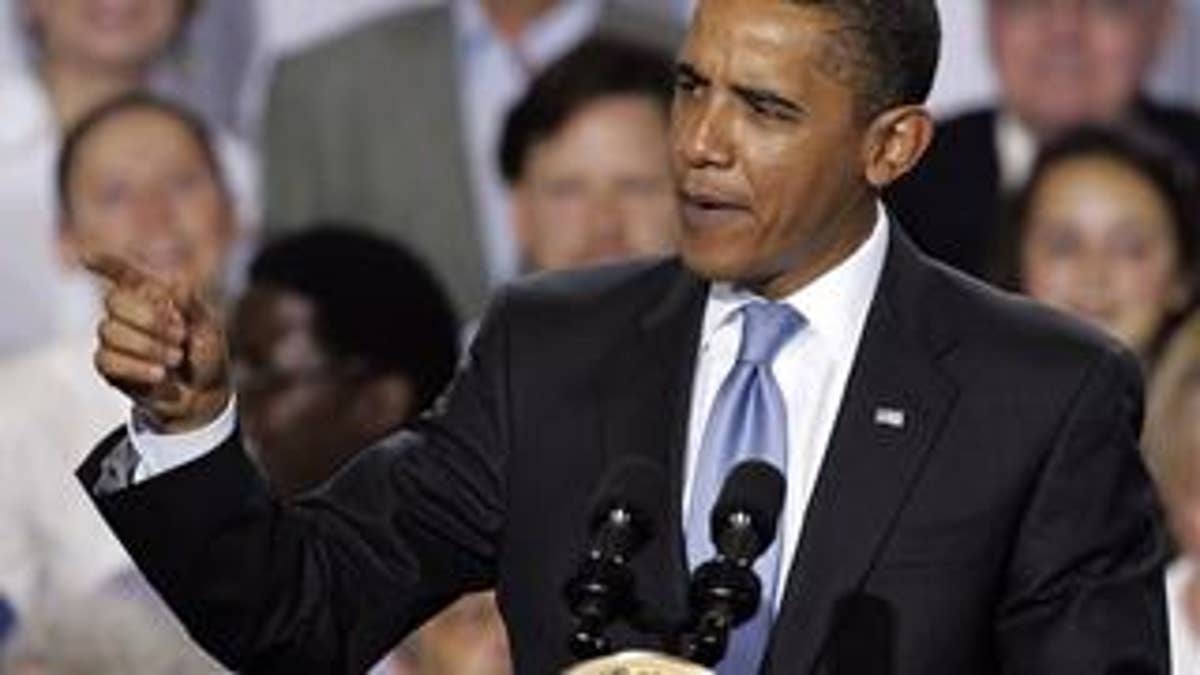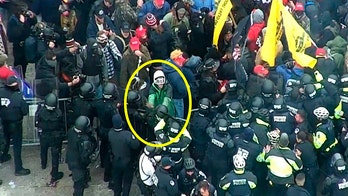
Doctors and patients will be in charge of health care, not government or insurance companies, President Obama told a mostly friendly town hall meeting on Tuesday, his first since lawmakers ventured out across the country to get feedback on a trillion-dollar, 10-year health care proposal.
Obama rallied support in Portsmouth, N.H as lawmakers confronted hostile audiences at forums across the country. In fact, the president's reception was among the friendliest elected officials have received since the debate began.
"This is not about putting the government in charge of your health insurance," Obama told the crowd at an area high school. "I don't believe anyone should be in charge of your health insurance decisions except you and your doctor.
"I don't think government bureaucrats should be meddling but I don't think insurance company bureaucrats should be meddling," he added, drawing thunderous applause.
"Your health insurance will be there for you when it counts, not just when you're paying premiums," Obama said.
The White House is retooling its message amid polling that shows Americans -- especially those who already have coverage -- skeptical of the Democratic proposals to expand coverage to millions.
A new Rasmussen Reports national telephone survey shows that support of the plan has fallen to a new low of 42 percent while opposition has increased to 53 percent, up 9 percentage points since late June.
The shift is a potential blueprint for Democratic lawmakers' during the August recess who've faced boisterous crowds wanting to know whether the government is going to pay for abortions, ration care, deny services, treat illegal immigrants or raise taxes to pay for the plan.
Much of the response by Democrats to opponents has been to accuse them of being manufactured, angry mobs who special interest groups have dropped off by the busload at various meetings.
On Tuesday, that tactic shifted when White House Press Secretary Robert Gibbs suggested that if the plan fails, cable news is to blame.
"I think we all have something to lose ... if we let cable television come to town hall meetings and kill health care reform for another year, and put the special interests back in charge," Gibbs told reporters.
Obama faced no disruptions at his meeting, instead taking questions from supporters who soft-balled him opportunities to knock down criticism.
For example, Obama used his second question -- from a young girl who asked why people were saying such bad things about the plan -- to try to put to rest claims that the Democratic-sponsored legislation would set up "death panels" to rule on life-sustaining care for ailing seniors.
The provision cited by opponents would authorize Medicare to pay doctors for counseling patients about end-of-life care, living wills, hospice care and other issues, if the patient wants it, Obama said. He said the idea originally came from Republican former congressman, now Sen. Johnny Isakson of Georgia.
It would not "basically pull the plug on grandma because we decided that it's too expensive to let her live anymore."
After the event, Isakson issued a statement denouncing Obama's attempt to connect him to language in the bill. He said that he successfully offered an amendment in a Senate version of the bill that allows individuals to "make their own choices on these critical issues rather than the government incentivizing doctors to conduct counseling on government-mandated topics."
Isakson ultimately voted against the Senate Health and Education Committee's version of the bill.
"This is what happens when the president and members of Congress don't read the bills," Isakson, R-Ga., said. "The White House and others are merely attempting to deflect attention from the intense negativity caused by their unpopular policies. I never consulted with the White House in this process and had no role whatsoever in the House Democrats’ bill. I categorically oppose the House bill and find it incredulous that the White House and others would use my amendment as a scapegoat for their misguided policies."
Back at the town hall, nearly an hour into the meeting, Obama had to ask for skeptics of his plan to come forward.
One self-professed skeptic asked why Obama had not used his bully pulpit to chastise Congress for having access to one system of health care that wasn't available to the public.
Obama, who acknowledged Congress has a good deal with its health insurance options, said the gap will remain as wide without reform. He did not say whether lawmakers would be compelled to use the plan that would be made available to the public.
Like nearly every other town hall the White House has hosted, the vast majority of the tickets were made available through a Web site where people could register for the opportunity to receive tickets to attend.
The remaining tickets were distributed by the White House to elected officials, community leaders and other supporters. About 1,800 people were in the audience. None of the participants, or their questions, were screened, the White House said.
Asked about the so-called softball questions, White House spokesman Reid Cherlin declined to speculate whether it was respect for the office or another reason. Cherlin insisted that the White House made no attempt to fill the auditorium with supporters.
The audience for the event was picked randomly by computer from "something like an Excel program function" after people requested tickets, Cherlin said.
At the town hall, the president said he seeks a rational debate and took a poke at critics who he said were trying to "scare the heck out of folks." He said there should be a vigorous debate over health care, but "with each other, not over each other."
"Where we disagree, let's disagree over things that are real, not these wild misrepresentations that don't bear any resemblance to anything that's actually being proposed," Obama said.
He accused critics of creating a "bogeymen."
"Spread the facts. Let's get this done," Obama implored the crowd.




